How to Cure Afrin Addiction

Understanding Afrin Addiction and Its Consequences
Afrin addiction, a type of nasal spray dependence, can sneak up on users who rely on the product beyond its recommended usage period. This condition, sometimes referred to as rhinitis medicamentosa, is prompted by the overuse of Afrin, leading to rebound congestion which worsens over time. As users struggle to breathe normally without it, the cycle of dependency deepens. In this article, we'll explore how Afrin addiction occurs, its effects and risks, and provide strategies and alternatives for breaking free from dependency to reclaim nasal health.
How Afrin Addiction Develops and Its Risks
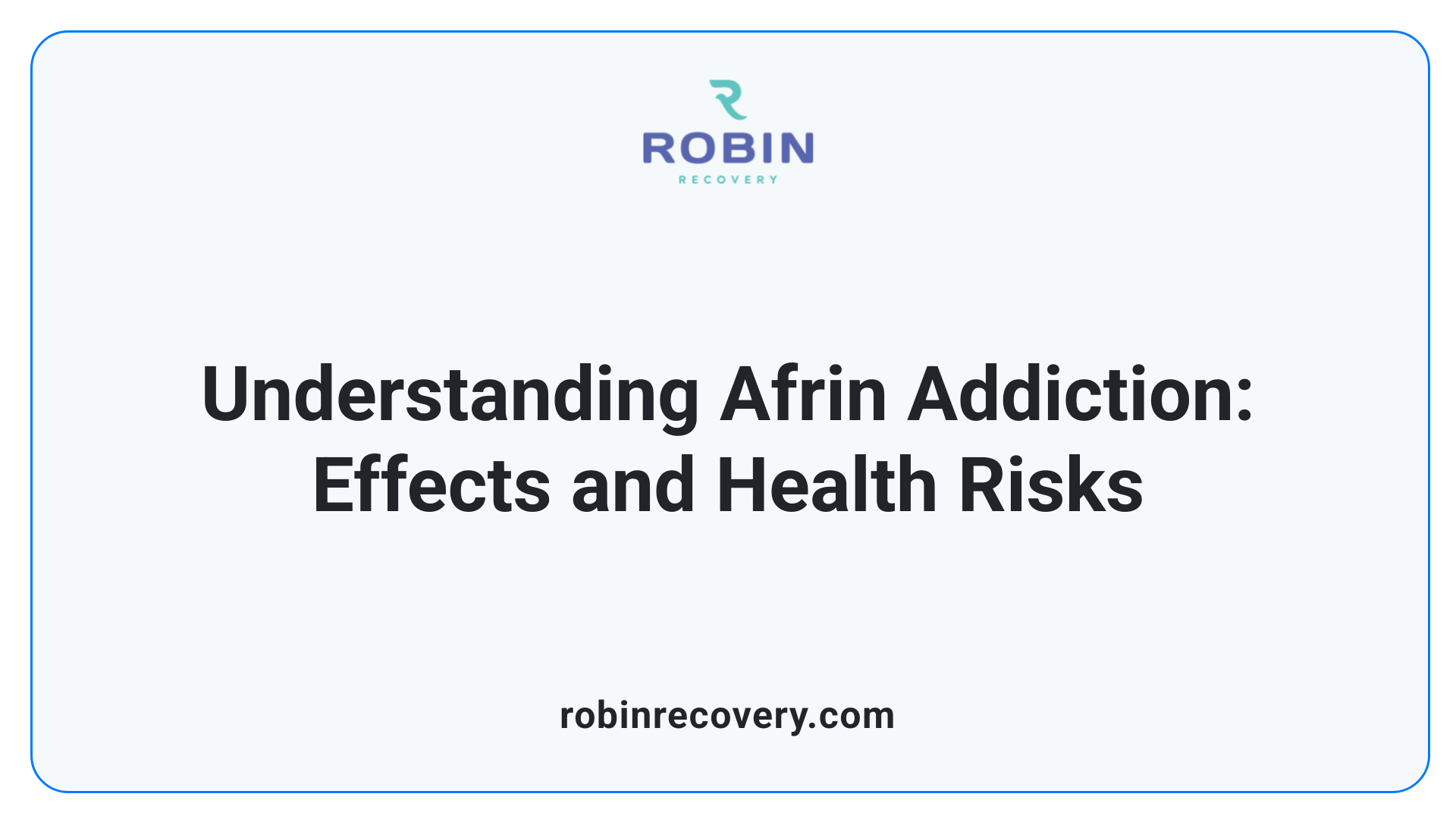
What are the effects and health risks of Afrin addiction?
Afrin addiction often emerges after the nasal spray is misused for more than three days, leading to a phenomenon called rebound congestion, or rhinitis medicamentosa. Initially, Afrin (oxymetazoline) works by constricting blood vessels in the nasal passages, providing swift relief from congestion. However, prolonged use triggers a cycle where the body adapts, worsening congestion upon cessation and reinforcing the dependence on the spray.
The side effects associated with Afrin overuse can significantly impact daily life. Users may suffer from:
- Nasal irritation and inflammation.
- Persistent stuffiness and an overall feeling of discomfort.
- Difficulty sleeping due to nasal blockages.
- Nervousness or anxiety when away from the spray.
- Headaches or even cardiovascular issues in extreme cases.
Although physical tolerance can develop, this differs from a psychological addiction, where cravings typically arise. Instead, Afrin users may find themselves self-medicating to avoid the frustrating rebound congestion that occurs after stopping the spray.
Effective treatment options commonly include a gradual tapering off of Afrin use, combined with alternatives such as saline sprays or corticosteroids to mitigate withdrawal effects while restoring nasal health.
Exploring the Mechanism of Afrin Addiction
The addiction to Afrin unfolds through the mechanism of rebound congestion, whereby the nasal tissues become inflamed and require more frequent applications of the spray for relief. This cycle can lead to structural changes in the nasal cavity if not addressed, eventually complicating overall nasal health.
The Impact on Nasal Health
Over time, dependency might unleash various complications, including frequent sinus infections due to chronic obstruction. Long-term use can lead to conditions like atrophic rhinitis, characterized by thinned mucous membranes, exacerbating the patients' discomfort.
Understanding the risks associated with Afrin dependency is vital for maintaining nasal health and remedying any issues caused by misuse.
Unraveling the Mechanism of Rebound Congestion
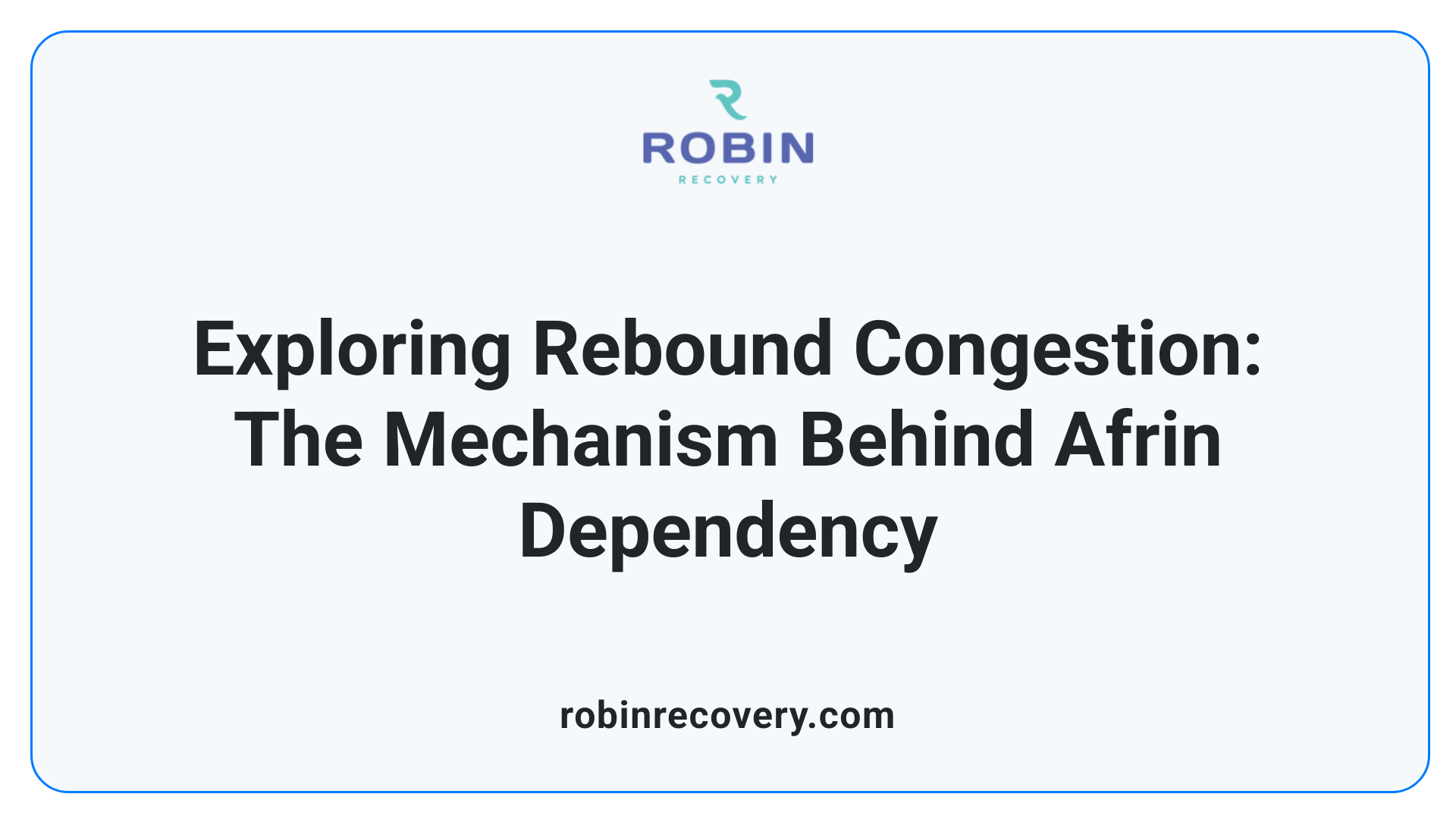
How does rebound congestion related to Afrin occur?
Rebound congestion, medically referred to as rhinitis medicamentosa, primarily arises from the prolonged use of nasal sprays containing oxymetazoline, such as Afrin. Typically, these sprays are intended for short-term relief, but when used for more than 3 to 5 days, they can lead to significant inflammation and blockage of the nasal passages.
The active ingredient, oxymetazoline, constricts blood vessels in the nasal tissue, providing quick relief from congestion. However, after prolonged use, the body adapts to the medication, and when the effects wear off, users experience worsened congestion. Common signs of rebound congestion include:
- Decreased effectiveness of the spray
- Increased nasal stuffiness, even after using the spray
- Discomfort or pressure in the nasal passages
To address rebound congestion effectively, it's vital to cease using the nasal spray. Withdrawal symptoms can last from several days to weeks, but many individuals begin to notice improvements within a few days. During recovery, alternatives such as nasal steroid sprays like Flonase (fluticasone) can offer relief without prompting the same dependency risks.
Long-term effects
Long-term use of Afrin and similar sprays not only fosters dependency but can also lead to chronic issues, including structural changes in the nasal cavity. Continued inflammation may result in a condition known as atrophic rhinitis, where the nasal mucous membranes thin out, potentially leading to further complications like frequent sinus infections and malodorous discharge. Therefore, understanding and addressing rebound congestion is crucial for long-term nasal health.
Breaking Free from Afrin: Steps to Quitting
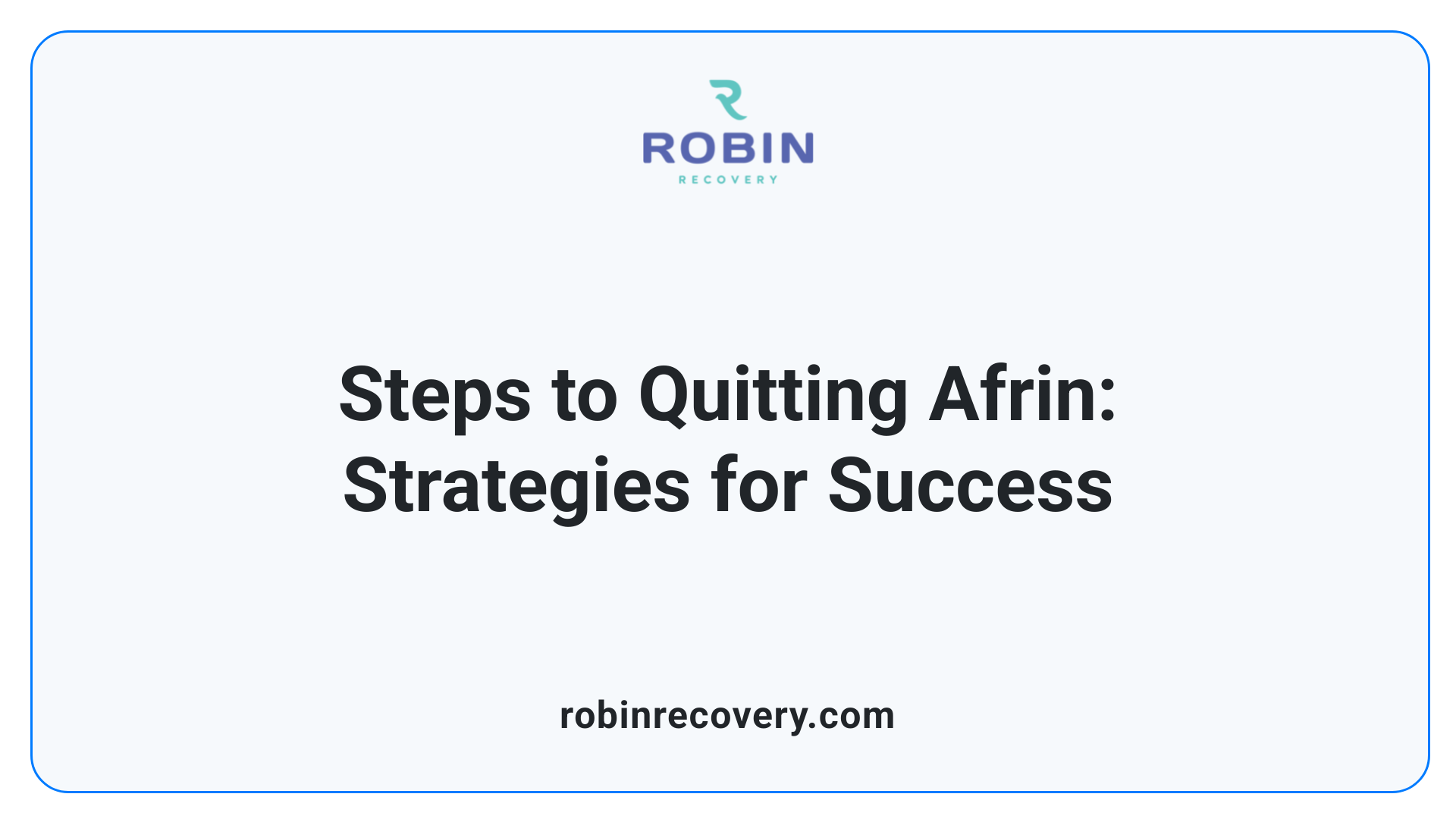
What are some strategies to quit using Afrin?
To successfully quit using Afrin, it’s crucial to address the rebound congestion that arises from its overuse. One effective strategy is to gradually taper off the spray rather than stopping abruptly. This method helps reduce withdrawal symptoms and make the transition smoother.
Gradual tapering vs. cold turkey
While some may choose to stop Afrin cold turkey, which can lead to severe congestion for several days, a gradual tapering method allows the nasal passages to adjust gradually. By reducing the frequency of use over time, the body can recover without triggering acute withdrawal symptoms.
Alternative treatments
During the tapering process, consider switching to alternative treatments. Options include:
- Saline nasal sprays: Use saline solutions to keep nasal tissues moist.
- Oral decongestants: Such as pseudoephedrine, which alleviates congestion without the risk of rebound effects.
- Nasal steroids: Medications like Flonase and Nasonex can help reduce inflammation and restore normal function.
Personalized healthcare plans
Consulting a healthcare provider is invaluable for creating a personalized withdrawal plan. Health professionals can tailor approaches to individual needs, which may include symptom management or exploring behavioral therapies. Monitoring usage and adhering to guidelines—such as limiting use to 3 consecutive days—can prevent the development of dependence and ultimately lead to relief from Afrin addiction.
Recognizing Signs of Afrin Dependence
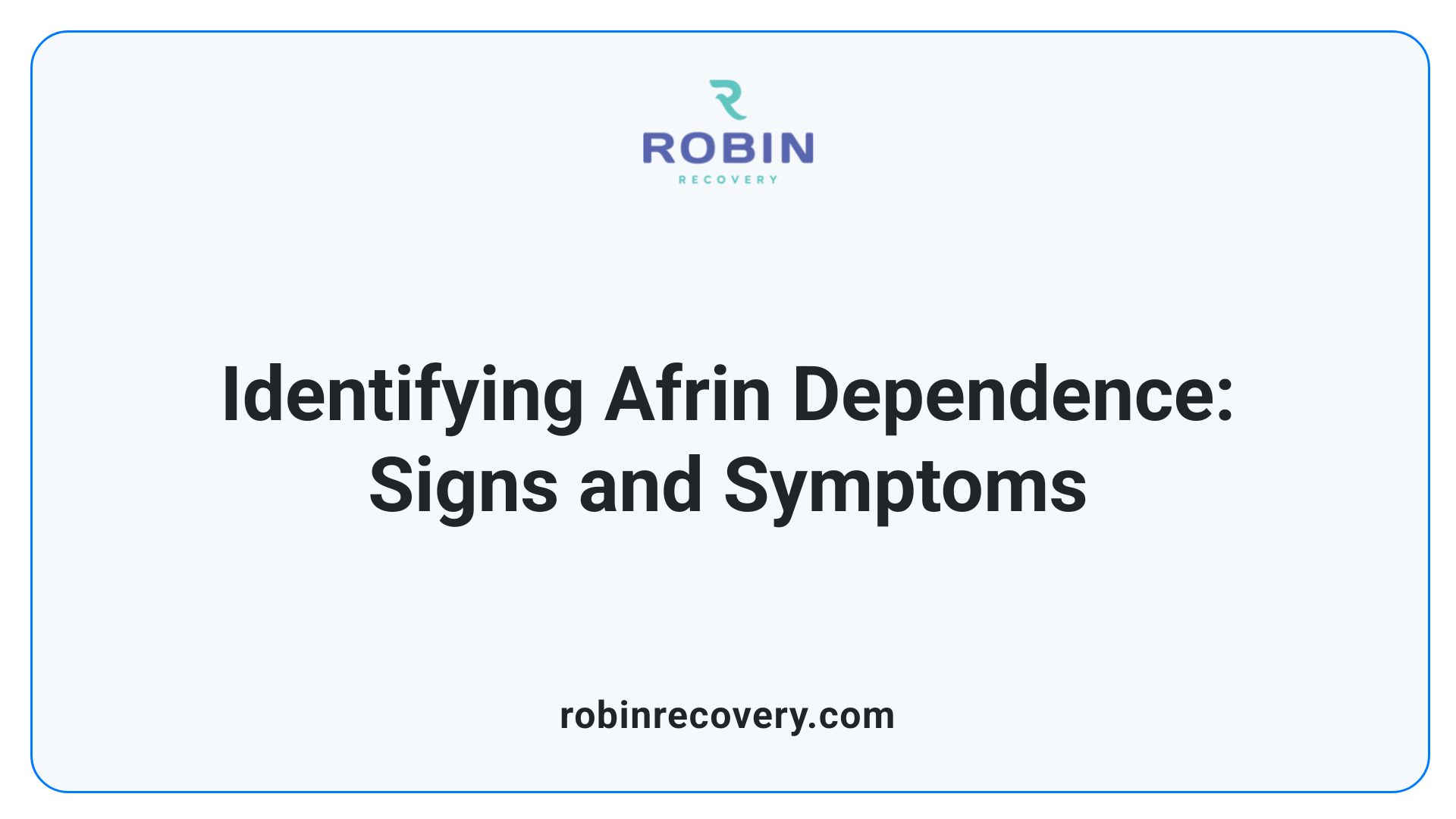
What are the signs and symptoms of Afrin dependence?
Afrin dependence can manifest in various signs and symptoms that indicate a growing reliance on the nasal spray. Users may notice a need to use the spray more frequently than originally intended, often resorting to it as congestion returns shortly after use. Anxiety about stopping the spray is common, creating a compulsive need to have it available.
Physically, symptoms can include:
- Burning or stinging sensations in the nasal passages
- Increased mucus production
- Dryness and irritability within the nose
- Frequent headaches
Moreover, withdrawal symptoms occur when attempting to discontinue Afrin. These can manifest as a runny nose, sore throat, sneezing, and sinus pressure, signaling that the nasal passages are adjusting back to normal function.
Long-term misuse of Afrin not only leads to rebound congestion—characterized by a worsening of symptoms when the spray is not used—but can also cause structural damage to the nasal mucous membranes. This condition, known as rhinitis medicamentosa, exacerbates the cycle of dependency, making recovery more challenging.
As dependence deepens, individuals may struggle to sleep without the spray and feel persistent cravings for its relief, highlighting the need for awareness and intervention for Afrin misuse.
Alternatives for Managing Afrin Addiction
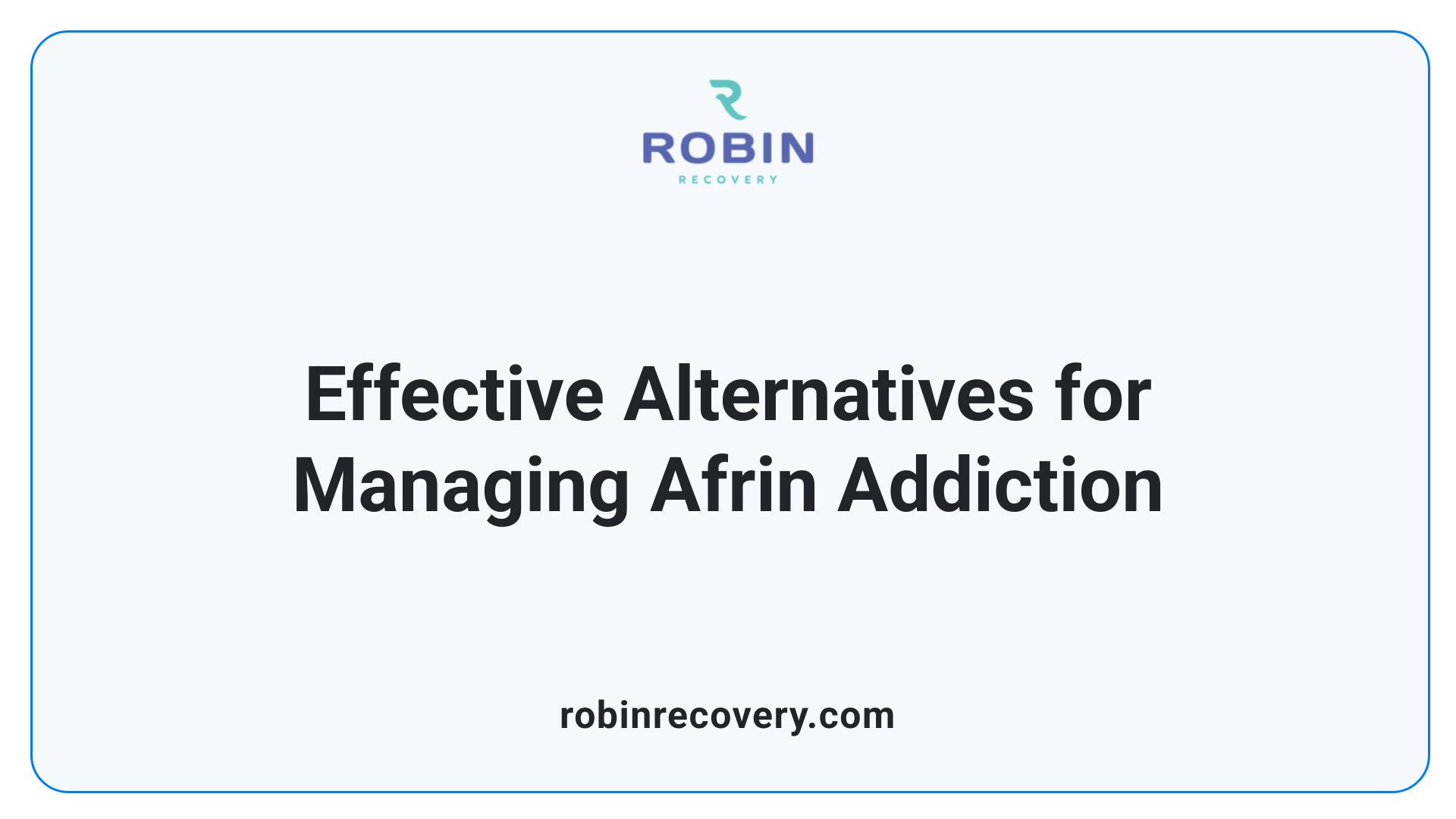
What are the alternative treatments for dealing with Afrin addiction?
Managing Afrin addiction requires effective alternatives that do not contribute to further nasal congestion. Several safer treatment options are available when transitioning away from decongestants.
- Saline Nasal Sprays:
- Safe for all ages.
- Help to thin mucus, alleviate dryness, and restore moisture in nasal passages.
- Nasal Irrigation:
- Using a neti pot or saline rinse can flush out mucus.
- Always use sterile or distilled water to prevent infections.
- Humidifiers:
- Adding moisture to the air can ease congestion.
- Helps with overall sinus drainage.
- Warm Compresses:
- Reduces inflammation when applied to the face.
- Opens nasal passages and promotes relief.
- Hydration and Diet:
- Staying well-hydrated aids in thinner mucus production.
- Spicy foods can temporarily enhance nasal airflow.
- Essential Oils:
- Steam inhalation with oils like eucalyptus may provide relief.
- Aromatherapy can help soothe nasal discomfort.
How can holistic approaches assist with Afrin addiction?
Holistic methods can greatly support recovery. In addition to saline sprays and humidifiers, techniques such as stress management and regular exercise can enhance overall wellness. Acupressure or acupuncture may also be effective in relieving sinus pressure.
What is the role of healthcare support in overcoming Afrin addiction?
Engaging with healthcare providers is crucial for managing Afrin addiction. They can help in creating a tailored withdrawal plan, suggesting appropriate alternatives, and prescribing medications like nasal steroids that do not lead to dependence. Support from an ENT specialist ensures a comprehensive approach to recovery, addressing both physical and psychological aspects of the addiction.
Managing Afrin Withdrawal and Finding Educational Resources
How can withdrawal symptoms from Afrin be managed?
Managing withdrawal symptoms from Afrin requires a structured approach to minimize discomfort. Gradual reduction of Afrin use is often recommended. Stopping the spray abruptly may exacerbate congestion and discomfort. Instead, consider these strategies:
- Designate a Stop Day: Choose a specific day to start tapering off Afrin.
- Dispose of Afrin Bottles: Remove temptation by throwing away any remaining spray bottles.
- Use Alternative Treatments: Replace Afrin with saline nasal sprays, glucocorticoid nasal sprays, or oral decongestants that do not risk rebound congestion.
- Consult a Healthcare Provider: Collaborating with a medical professional can personalize the management plan and ensure effective coping strategies.
Most individuals find relief from withdrawal symptoms within a few days to weeks, underscoring the necessity of a carefully managed process.
Where can I find educational resources about nasal spray addiction and rhinitis medicamentosa?
Educational resources on nasal spray addiction and rhinitis medicamentosa (RM) can be accessed through reputable medical websites. For example:
Resource Description Website WebMD Provides comprehensive information on medications and conditions. www.webmd.com Mayo Clinic Offers expert advice and treatment options for various health conditions, including nasal issues. www.mayoclinic.org American Academy of Otolaryngology Highlights insights into ear, nose, and throat conditions, including rhinitis medicamentosa. www.entnet.org
Understanding rhinitis medicamentosa is crucial, especially since it can begin with just a few days of nasal spray use. These resources emphasize safe practices and alternative therapies and underscore the significance of professional consultation for tailored support during recovery.
Moving Towards Healthier Nasal Habits
Breaking free from Afrin addiction requires commitment and informed strategies. Understanding the risks of prolonged nasal spray use and exploring healthier alternatives are critical steps towards recovery. With the right guidance and support, individuals can overcome dependence and improve their nasal health. It's important to seek medical advice and make use of available resources to ensure a successful transition away from dependence, paving the way for a healthier respiratory future.
References
- Suffering from nasal spray addiction? | Annapolis Allergy & Asthma
- Breaking the Habit: Understanding Afrin Addiction :
- Rhinitis Medicamentosa: How Long It Lasts & Treatment Options
- Nasal spray addiction – how to combat the addiction
- If you have a nasal spray addiction, it's time to put down the Afrin
- Help! I can't stop using Afrin® nasal spray!
- Afrin Addiction: I never meant to become a nasal spray junkie! - Issuu
- Nasal Spray Addiction: Withdrawal, Side Effects, and More - Healthline
- Rhinitis Medicamentosa (aka Afrin Addiction) - North Fulton ENT
